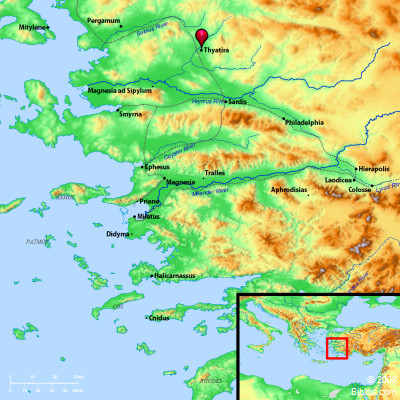Atlas  Thyatira and surrounding region Maps Created using Biblemapper 3.0 Additional data from OpenBible.info Occurrences Acts 16:14 A certain woman named Lydia, a seller of purple, of the city of Thyatira, one who worshiped God, heard us; whose heart the Lord opened to listen to the things which were spoken by Paul.Revelation 1:11 saying, " What you see, write in a book and send to the seven assemblies : to Ephesus, Smyrna, Pergamum, Thyatira, Sardis, Philadelphia, and to Laodicea." Revelation 2:18 "To the angel of the assembly in Thyatira write: "The Son of God, who has his eyes like a flame of fire, and his feet are like burnished brass, says these things: Revelation 2:24 But to you I say, to the rest who are in Thyatira, as many as don't have this teaching, who don't know what some call'the deep things of Satan,' to you I say, I am not putting any other burden on you. Encyclopedia THYATIRAthi-a-ti'-ra (Thuateira): Thyatira was a wealthy town in the northern part of Lydia of the Roman province of Asia, on the river Lycus. It stood so near to the borders of Mysia, that some of the early writers have regarded it as belonging to that country. Its early history is not well known, for until it was refounded by Seleucus Nicator (301-281 B.C.) it was a small, insignificant town. It stood on none of the Greek trade routes, but upon the lesser road between Pergamos and Sardis, and derived its wealth from the Lycus valley in which it rapidly became a commercial center, but never a metropolis. The name "Thyatira" means "the castle of Thya." Other names which it has borne are Pelopia and Semiramis. Before the time of Nicator the place was regarded as a holy city, for there stood the temple of the ancient Lydian sun-god, Tyrimnos; about it games were held in his honor. Upon the early coins of Thyatira this Asiatic god is represented as a horseman, bearing a double-headed battle-ax, similar to those represented on the sculptures of the Hittites. A goddess associated with him was Boreatene, a deity of less importance. Another temple at Thyatira was dedicated to Sambethe, and at this shrine was a prophetess, by some supposed to represent the Jezebel of Revelation 2:20, who uttered the sayings which this deity would impart to the worshippers. THYATI'RA, a city of Western Asia Minor, about 46 ms. n.e. from Smyrna, now called Ak Hissa, or the white castle, from a white rocky hill where a fortress once stood. It was celebrated from the time of Homer (II. iv. 141) for the dyeing trade. Pop. 15,000 two thirds of which are Christians. Strong's Greek G2363: ThuateiraThyatira, a city of Lydia |



